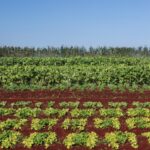Gene Likhanya, a macadamia nut farmer from Limpopo’s Vhembe district, is on the cusp of making history. His company, Madimbo Macs, along with 30 other emerging farmers, is preparing to export macadamia nuts to China during the next harvest season. This landmark achievement is a testament to Likhanya’s resilience, innovation, and commitment to empowering fellow black farmers.
Tapping Into South Africa-China Relations
Likhanya’s breakthrough comes against the backdrop of strengthened ties between South Africa and China. President Cyril Ramaphosa’s recent State Visit to China emphasized boosting economic cooperation, with trade between the two countries reaching $34 billion in 2023. China remains South Africa’s largest trading partner, importing goods worth $12 billion annually. These strong diplomatic and trade relations have opened doors for entrepreneurs like Likhanya to enter global markets.
A Dream Born on 2.5 Hectares
Likhanya began his farming journey in 2005 with just 2.5 hectares in Tshakhuma, inspired by an uncle who had ventured into agriculture. At the time, macadamia farming was a niche industry, unfamiliar to many black South Africans.
“I had saved up a bit of money and managed to purchase a 2.5-hectare farm. It was a road less taken,” Likhanya shared.
Over the past 19 years, he expanded his operation to more than 600 hectares, growing macadamias, bananas, honey, and avocados. Yet, his vision extended beyond personal success—he wanted to create opportunities for other black farmers in an industry that has long been inaccessible.
Breaking Barriers for Black Farmers
The macadamia market, as Likhanya explains, is not designed for small-scale farmers. “Emerging macadamia farmers are unable to walk into facilities with half a bakkie [of nuts],” he said, noting the industry’s preference for bulk transactions. This has long created barriers for smaller farmers who lack the resources to produce large volumes.
To address this challenge, Madimbo Macs developed a processing and marketing hub tailored to support emerging black farmers. This facility will allow them to collectively export their produce, meeting market demands and overcoming industry biases.
By the next harvest, the hub will export up to 1,000 tonnes of macadamia nuts to China—99% of which will be produced by black farmers. Around 30 farmers, producing between five and 50 tonnes each, will benefit directly from this initiative.
“We’ve built the facility, established the market, and next year will be our first time exporting,” Likhanya said. “It’s a long-term business—it takes years to get to the point where you’re ready to export.”
A Journey of Resilience
Reflecting on his 19-year journey, Likhanya describes it as “rough” and “bumpy.” Entering an industry dominated by white farmers presented significant challenges, including lack of access to networks, funding, and machinery.
“We started with basic tools like a pick and shovel to clear the land. We didn’t have water rights but relied on rain. It was tough compared to where we are now,” he recalled.
The deal with China, achieved after 17 years of hard work, represents not only a personal victory but a step forward for black farmers in South Africa. Yet, Likhanya acknowledges there’s more to be done: “We need a bigger facility to support more farmers and scale operations.”
A Vision for the Future
Likhanya’s story is one of perseverance, innovation, and community upliftment. By building infrastructure and market access for small-scale farmers, he is paving the way for greater inclusivity in agriculture.
As his macadamia nuts make their way to China, Likhanya proves that with vision and determination, even the roughest roads can lead to global success.
Would you buy South Africa’s locally grown macadamia nuts knowing the story behind them? Share your thoughts and support the farmers shaping a greener, more inclusive future! 🌍🥜 #DriveTheTalk #GreenEconomy #MacadamiaSuccess
Join 'Farmers Mag' WhatsApp Channel
Get the latest Farming news and tips delivered straight to your WhatsApp
CLICK HERE TO JOIN






